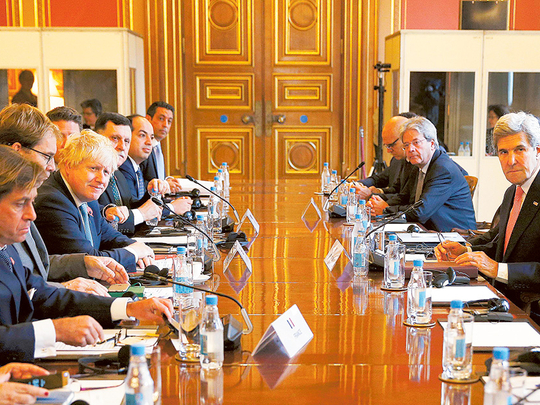
London: The US, British and Italian foreign ministers began talks with Libyan Prime Minister Fayaz Al Sarraj on Monday to tackle a political standoff preventing Tripoli’s UN-brokered unity government from expanding its authority outside the capital.
Al Sarraj and his two deputies met British Foreign Secretary Boris Johnson, US Secretary of State John Kerry and their Italian counterpart, Paolo Gentiloni, at the British Foreign Office in London. They made no comment before the meeting.
Monday’ session comes after the UN-backed Libyan government’s failure to win legitimacy — or to function at all — amid deep political fragmentation.
Since the fall of dictator Muammar Gaddafi to an uprising in 2011, Libya has been beset by factional fighting among brigades of ex-rebels who battled him and then turned on each other.
The UN-backed government has failed to win endorsement of the eastern-based, internationally recognised parliament, which is a prerequisite to assume power. At the same time, Al Sarraj is facing a challenge from a self-declared prime minister in Tripoli who is trying to establish control in the chaotic North African country. There have been sporadic reports of violence in the capital and other parts of the country.
Western powers are alarmed about resistance to Al Sarraj and his Government of National Accord from the country’s eastern military commander General Khalifa Haftar, who has blocked a parliamentary vote to endorse the GNA.
The parliament based in Libya’s east has twice rejected lists of ministers put forward by the GNA leadership meant to represent the various sides in Libya’s fractured politics.
The failure to appoint a finance minister has stalled economic decision-making in the major oil-producing country, an Opec member. Monday’s meeting was to try to address ways to tackle Libya’s slide towards economic collapse.
Two side-effects of Libya’s protracted disorder are of major concern abroad — an uncontrolled flow towards Europe of migrants setting off in boats from Libya’s lawless shores where people smugglers operate, and an infiltration of Daesh militants now holding patches of the country’s territory.












